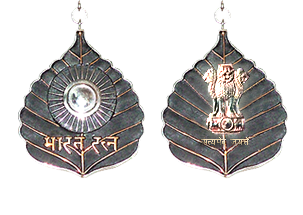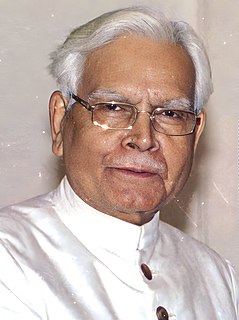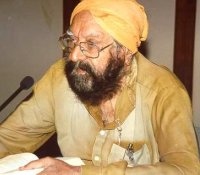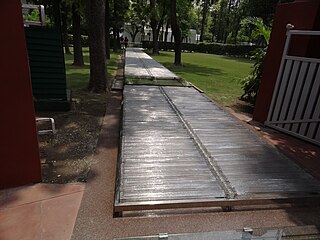Related Research Articles

Indira Priyadarshini Gandhi was an Indian politician and a central figure of the Indian National Congress. She was elected as third prime minister of India in 1966 and was also the first and, to date, only female prime minister of India. Gandhi was the daughter of Jawaharlal Nehru, the first prime minister of India. She served as prime minister from January 1966 to March 1977 and again from January 1980 until her assassination in October 1984, making her the second longest-serving Indian prime minister after her father.

Rajiv Gandhi was an Indian politician who served as the sixth prime minister of India from 1984 to 1989. He took office after the 1984 assassination of his mother, then Prime Minister Indira Gandhi, to become the youngest Indian Prime minister at the age of 40.

The Indian National Congress (INC), colloquially the Congress Party but often simply the Congress, is a political party in India with widespread roots. Founded in 1885, it was the first modern nationalist movement to emerge in the British Empire in Asia and Africa. From the late 19th century, and especially after 1920, under the leadership of Mahatma Gandhi, the Congress became the principal leader of the Indian independence movement. The Congress led India to independence from the United Kingdom, and significantly influenced other anti-colonial nationalist movements in the British Empire. Due to its enduring history, the Congress is often called the "grand old party".

The Bharat Ratna is the highest civilian award of the Republic of India. Instituted on 2 January 1954, the award is conferred in recognition of "exceptional service/performance of the highest order", without distinction of race, occupation, position, or sex. The award was originally limited to achievements in the arts, literature, science, and public services, but the government expanded the criteria to include "any field of human endeavour" in December 2011. The recommendations for the Bharat Ratna are made by the Prime Minister to the President, with a maximum of three nominees being awarded per year. The recipients receive a Sanad (certificate) signed by the President and a peepal leaf-shaped medallion. There is no monetary grant associated with the award. Bharat Ratna recipients rank seventh in the Indian order of precedence.
Events in the year 1984 in the Republic of India.

Sanjay Gandhi was an Indian politician and the younger son of Indira Gandhi and Feroze Gandhi. He was a member of parliament, Lok Sabha and the Nehru–Gandhi family. During his lifetime, he was widely expected to succeed his mother as head of the Indian National Congress, but following his early death in a plane crash his elder brother Rajiv became their mother's political heir and succeeded her as Prime Minister of India after her assassination. His wife Maneka Gandhi and son Varun Gandhi are politicians in the Bharatiya Janata Party.

Kunwar Natwar Singh, IFS is an Indian diplomat and politician who served as the Minister of External Affairs from May 2004 to December 2005.

Khushwant Singh was an Indian author, lawyer, diplomat, journalist and politician. His experience in the 1947 Partition of India inspired him to write Train to Pakistan in 1956, which became his most well-known novel.
Satwant Singh was one of the Sikh bodyguards, along with Beant Singh, who assassinated the Prime Minister of India, Indira Gandhi, at her New Delhi residence on 31 October 1984.

Major Hari Pal Singh Ahluwalia was an Indian mountaineer, author, social worker and retired Indian Army officer. During his career he made contributions in the fields of adventure, sports, environment, disability and social work. He is one of six Indian men and the twenty first man in the world to climb Mount Everest. On 29 May 1965, 12 years to the day from the first ascent of Mount Everest, he made the summit with the fourth and final successful attempt of the 1965 Indian Everest Expedition along with H. C. S. Rawat and Phu Dorjee Sherpa. This was the first time three climbers stood on the summit together.
Balraj Puri (1928-2014) was an Indian Political commentator and human rights activist.

Indian Prime Minister Indira Gandhi was assassinated at 9:29 a.m. on 31 October 1984 at her residence in Safdarjung Road, New Delhi. She was killed by her Sikh bodyguards Satwant Singh and Beant Singh in the aftermath of Operation Blue Star, an Indian military action carried out between 1 and 8 June 1984 ordered by Indira Gandhi to remove Jarnail Singh Bhindranwale and his followers from the Golden Temple of Harmandir Sahib in Amritsar, Punjab. The collateral damage included the death of many pilgrims, as well as damage to the Akal Takht. The military action on the sacred temple was criticized both inside and outside India.

The 1984 Anti-Sikh Riots, also known as the 1984 Sikh Massacre, was a series of organised pogroms against Sikhs in India following the assassination of Indira Gandhi by her Sikh bodyguards. Government estimates project that about 2,800 Sikhs were killed in Delhi and 3,350 nationwide, whilst independent sources estimate the number of deaths at about 8,000–17,000.

Vijay Prakash Singh, also known as Vijay Prakash, is an Indian gastroenterologist and the Head of Department of Gastroenterology at Patna Medical College, Bihar.He was honoured by the Government of India in 2003 with Padma Shri, the fourth highest Indian civilian award, and only the 7th doctor in Bihar state to receive the award.
Maria Renée Cura was an Argentinian geographer, writer and Indologist. She was the founder of Anand Bhavan, a centre for Indological studies, at her native place, Chivilcoy in Buenos Aires, Argentina, named after the present day Allahabad museum and the former residence of Nehru family.
Ganeshan Venkataraman is an Indian condensed matter physicist, writer and a former vice chancellor of the Sri Sathya Sai University. An elected fellow of the Indian National Science Academy, and the Indian Academy of Sciences, Venkataraman is a recipient of Jawaharlal Nehru Fellowship, Sir C. V. Raman Prize of the University Grants Commission and the Indira Gandhi Prize for Popularisation of Science of the Indian National Science Academy. The Government of India awarded him the fourth highest civilian award of Padma Shri in 1991.
Sneh Bhargava is an Indian radiologist, medical academic and a former director and Professor Emeritus of the All India Institute of Medical Sciences, New Delhi. Born in 1930, she is a former vice president and an elected Fellow of the National Academy of Sciences, India, one of the premier scientific societies in India. She has delivered several keynote addresses and has been part of medical ethics related investigations of the Medical Council of India. After superannuation from AIIMS, she works at Dharamshilla Nrayana Superspeciality hospital Mayur Vihar Phase 3, New Delhi. The Government of India awarded her the fourth highest civilian award of the Padma Shri, in 1991. She played a major role in the unsuccessful attempt to revive Indira Gandhi right after the latter's assassination attempt.
Jagdev Singh Guleria is an Indian general physician, cardiologist and a former Dean and Professor of the All India Institute of Medical Sciences, New Delhi. He is the senior consultant of General Medicine at Sitaram Bhartia Institute of Science and Research and an Emeritus Professor of the National Academy of Medical Sciences. He received the fourth highest Indian civilian honour of the Padma Shri in 2003.
Bhairab Dutt Pandey was a member of the Indian Civil Service and Union Cabinet Secretary of the Government of India under Indira Gandhi. He served as the Governor of West Bengal (1981–1983), and Punjab (1983–1984), and the Administrator of Chandigarh for a brief period.
Sheesh Ram is an ex-soldier of the Indian Army and a painter specialising in depicting themes like national integration, women empowerment, Indian warfare, terrorist attacks in India and the world. After 40 years of service in the Indian Army he retired in the year 2007. While he was in service and also after retirement he has been creating paintings on various themes like battle scenes, patriotism and soldiers' sacrifices. Many of his paintings have been installed in the Art Gallery of the Army. He had also conducted an exhibition of his paintings in Dubai. He has also designed many medals for the Army. Medals designed by him are still used for conferring Army, Air Force, Navy and Paramilitary honours. In the year 2022, Govt of India honoured Sheesh Ram by conferring the Padma Shri award for his contributions to art.
References
- ↑ "Gandhis out to lunch with former family physician". Deccan Herald. 3 May 2012. Retrieved 14 July 2015.
- ↑ "Assassination of PM Indira Gandhi". 1984 Tribute. October 2011. Retrieved 14 July 2015.
- ↑ "Padma Awards" (PDF). Ministry of Home Affairs, Government of India. 2015. Archived from the original (PDF) on 15 October 2015. Retrieved 18 June 2015.